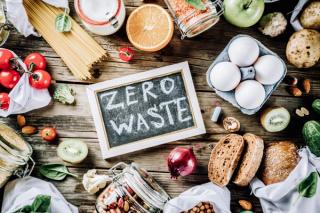
Successful transition plans are about both the ‘why’ and the ‘how’
by Harrison Oosterwyk, Lara Mills
View post

September 29th is International Day of Awareness of Food Loss and Waste, a United Nations initiative created to raise awareness of the fact that 33% of global food produced is wasted. The goal of the day is to emphasize the importance of the food problem and recommend actions on a personal, regional, and global scale.
We were lucky to have the opportunity to chat with Andy Street. Andy is a founder of SLR and waste resource expert; he also helped start FareShare, an organization that redistributes food that would otherwise be wasted, to charities and community groups that feed the hungry. To help bring awareness to this issue, Andy answered a few questions about food waste to help promote global efforts and collective action towards reducing food loss and waste.
Q: Can you tell everyone a little about yourself, and what you do?
A: After graduating as a Civil Engineer in the late 1970’s most of my career has involved working as a consultant in the environmental sector focusing on waste management. This has taken me all over the world, and an involvement in a wide range of projects. In the mid-1990’s I was one of the founding Directors of SLR Consulting, although in recent years I have stepped away from full-time work. Alongside my role at SLR, I’ve become extensively involved in charity work, setting up social enterprises and social investment funds, and other community-based initiatives focusing on a collaborative approach to city transformation.
Q: Can you expand on the charity work you are currently doing?
A: One of the first charities I got involved with was FareShare – initially as a Trustee of the national charity, and then as Founder and Chair of one of the regional operations, FareSare South West. The goal of FareShare is to work closely with the food sector across the UK and to redistribute surplus food to community-based charities that then create meals and feed vulnerable people. There are huge volumes of perfectly good food that go to waste and FareShare simply works to provide the service to intercept that food before it becomes waste, and to distribute it to those in need. Over the last year alone FareShare has distributed over 55,000 tonnes of food to around 10,000 charities across the UK, facilitating the provision of some 132 million meals for those in need. It’s an initiative that I am honored and humbled to be a part of. There are now 20 regional centers covering the whole of the UK, and FareShare is by far the largest surplus food redistributor in the UK.
Q: What made you passionate about food waste?
A: Through my day-to-day involvement in waste management consulting I have always been aware of the huge quantities of perfectly fit-for-purpose food that was going to waste (historically sent to landfill and in more recent years to processing through anaerobic digestion) but, if diverted, could be used to feed the most vulnerable in our society. Whilst we have much better ways to manage food waste these days, by far the most sustainable way to manage fit-for-purpose surplus food is to feed people and avoid it becoming waste in the first place. It makes complete sense!
Q: What does International Day of Awareness on Food Loss and Waste mean to you?
A: It creates a huge opportunity to raise awareness about the ways we use food and manage food surplus and waste. There’s so much that every one of us can do to contribute to reducing food loss and waste in the system and ensuring as much food as possible is used for its principal purpose – to feed people!
Q: What’s next for FareShare or your other charity involvements?
A: FareShare continues to grow and expand its operations. Recently it was voted national charity of the year in the UK, and this helps to raise awareness across all sectors, and ultimately to improve the ways we manage food, maximize the use of food surplus to support the most vulnerable, and minimize food loss and wastage. Personally, I remain committed to FareShare, alongside the 7 or 8 other charities and social enterprises that I’m involved in.
Q: What are some key takeaways regarding food waste you would like readers to remember?
A: I would like the audience to try and remember the entire food life cycle before wasting food. Think of how much time, effort and resources go into producing the food available to them. From fertilizing and farming the land, animals, staff at processing facilities, energy, transportation, all the emissions, all the impacts just for all of us to have fresh food readily available. There are so many moving parts and people work very hard to ensure food is easily accessible to you. At the same time, there are so many individuals who could benefit from food surplus and the nutritious meals that can be provided. Try to only buy what you need and use every part of the food you purchase, but also think of those who too often struggle to provide enough food for themselves and their families.
Additional tips avoid food loss:
Join SLR in our collaborative approach of changing how we view food waste, loss, and surplus. We can all make a difference by changing food shopping habits, preparation, and utilizing every part of produce and meat. Every action makes a difference and together we can be the much needed change.

by Harrison Oosterwyk, Lara Mills

by Peter Polanowski, Jerry Demchuk

by Emma Lawrence